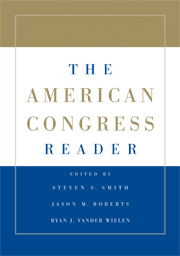Book contents
- Frontmatter
- Contents
- THE AMERICAN CONGRESS READER
- PART I THE AMERICAN CONGRESS: MODERN TRENDS
- PART II REPRESENTATION AND LAWMAKING IN CONGRESS: THE CONSTITUTIONAL AND HISTORICAL CONTEXT
- PART III CONGRESSIONAL ELECTIONS AND POLICY ALIGNMENTS
- PART IV MEMBERS, GOALS, RESOURCES, AND STRATEGIES
- PART V PARTIES AND LEADERS
- PART VI THE STANDING COMMITTEES
- PART VII THE RULES OF THE LEGISLATIVE GAME
- PART VIII THE FLOOR AND VOTING
- PART IX CONGRESS AND THE PRESIDENT
- PART X CONGRESS AND THE COURTS
- PART XI CONGRESS, LOBBYISTS, AND INTEREST GROUPS
- PART XII CONGRESS AND BUDGET POLITICS
- 38 Appropriations in the Republican Era
- 39 Pet Projects' Veil Is Only Partly Lifted
- PART XIII FURTHER READINGS ON CONGRESSIONAL POLITICS
38 - Appropriations in the Republican Era
Published online by Cambridge University Press: 05 June 2012
- Frontmatter
- Contents
- THE AMERICAN CONGRESS READER
- PART I THE AMERICAN CONGRESS: MODERN TRENDS
- PART II REPRESENTATION AND LAWMAKING IN CONGRESS: THE CONSTITUTIONAL AND HISTORICAL CONTEXT
- PART III CONGRESSIONAL ELECTIONS AND POLICY ALIGNMENTS
- PART IV MEMBERS, GOALS, RESOURCES, AND STRATEGIES
- PART V PARTIES AND LEADERS
- PART VI THE STANDING COMMITTEES
- PART VII THE RULES OF THE LEGISLATIVE GAME
- PART VIII THE FLOOR AND VOTING
- PART IX CONGRESS AND THE PRESIDENT
- PART X CONGRESS AND THE COURTS
- PART XI CONGRESS, LOBBYISTS, AND INTEREST GROUPS
- PART XII CONGRESS AND BUDGET POLITICS
- 38 Appropriations in the Republican Era
- 39 Pet Projects' Veil Is Only Partly Lifted
- PART XIII FURTHER READINGS ON CONGRESSIONAL POLITICS
Summary
At one time, the House Committee on Appropriations was one of the two or three most powerful committees in Congress. Evans provides an insightful analysis of the declining power of the committee over federal spending during the period 1995 to 2000, years of Republican control of the House. Discretionary spending increased greatly during the period, as did the use of earmarks to target the favored projects of individual legislators.
The appropriations process in Congress has undergone significant change in the past twelve years. The Republican era, especially in the House of Representatives, transformed the politics of appropriations from its traditional bipartisanship to a far more partisan, even rancorous politics than was depicted by Richard F. Fenno in his classic study of the appropriations committees in the 1950s and 1960s, The Power of the Purse. Fenno found a highly unified House Appropriations Committee in which partisanship was played down in favor of intracommittee integration, expertise, professionalism, and compromise; the shared policy goal was guardianship of the Treasury.
This relatively peaceful state of affairs was not to last forever; indeed, it began to slip within a few years. Both the congressional budget process instituted in 1974 and the growing polarization of the congressional parties contributed to the shift. Not surprisingly, scholars found an increase in partisanship on both the House and Senate appropriations committees in the post-reform era. Nevertheless, the House Appropriations Committee in particular continued to exhibit a degree of bipartisanship and independence unusual on the Hill in the 1980s.
- Type
- Chapter
- Information
- The American Congress Reader , pp. 429 - 435Publisher: Cambridge University PressPrint publication year: 2008



